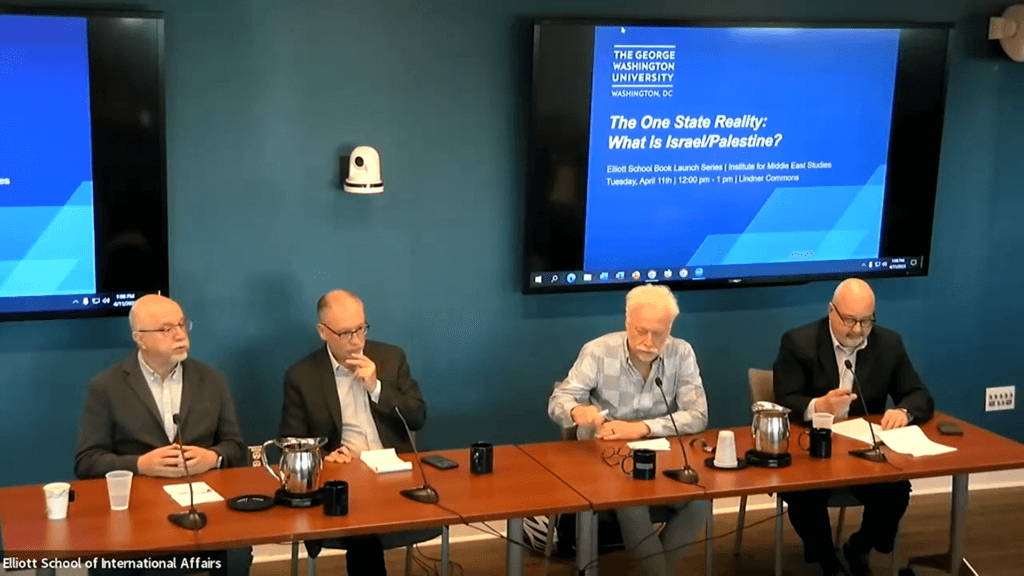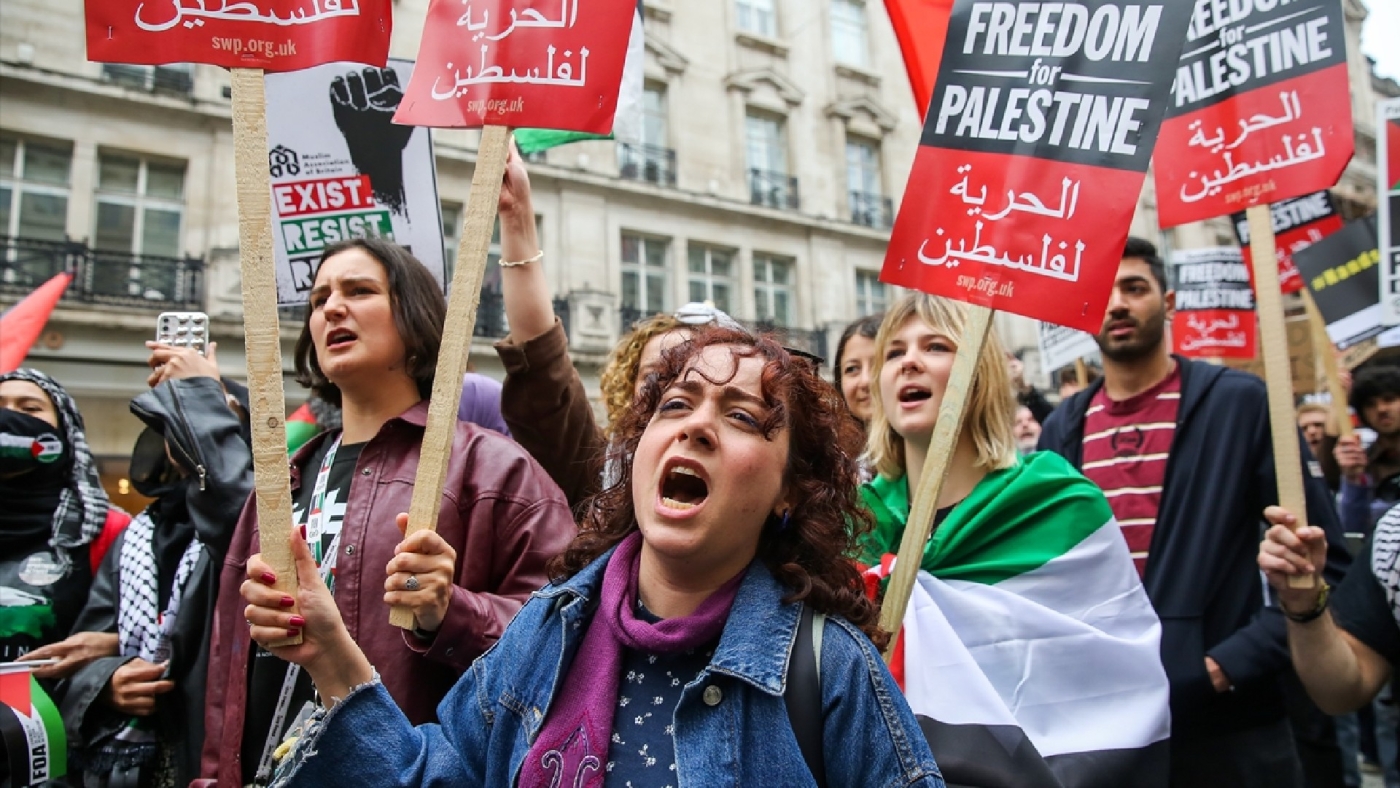Truman Adviser Recalls Fateful 1948
US Decision to Recognize Israel
Link:
https://ihr.org/other/trumandecision_curtiss.html/
By Richard H. Curtiss
With US President George Bush [in 1991] increasingly frustrated by the Israeli-Palestinian problem, a new generation of Americans is asking an old question: Why must the US deal with this seemingly intractable dispute?
The answer, unfortunately, is that the US is largely responsible for the problem because of two American decisions in 1947 and 1948. Now, only the US can break the impasse, by forcing its Israeli client state to give back all or most of the land the United Nations allotted to Muslim and Christian inhabitants when it partitioned Palestine in 1947.
An “insider’s account” of the discussions leading up to these decisions has just been published by former Secretary of Defense Clark Clifford, one of the few living parties to the discussions leading to partition.
Most people who knew the Middle East at first hand opposed the partition plan, adopted by the United Nations on November 29, 1947. Patently unfair, it awarded 56 percent of Palestine to its 650,000 Jewish inhabitants, and 44 percent to its 1,300,000 Muslim and Christian Arab inhabitants.
Partition was adopted only after ruthless arm-twisting by the US government and by 26 pro-Zionist US senators who, in telegrams to a number of UN member states, warned that US goodwill in rebuilding their World War II-devastated economies might depend on a favorable vote for partition.
In a Nov. 10, 1945, meeting with American diplomats brought in from their posts in the Middle East to urge Truman not to heed Zionist urgings, Truman had bluntly explained his motivation: “I’m sorry, gentlemen, but I have to answer to hundreds of thousands who are anxious for the success of Zionism. I do not have hundreds of thousands of Arabs among my constituents.”
Immediately after the plan was adopted, however, extensive fighting broke out between Jews and Arabs, just as US diplomats had predicted. The Arab states categorically rejected the partition by outside parties of an overwhelmingly Arab land.
David Ben-Gurion, soon to be Israel’s first prime minister, had ordered his representatives at the UN to accept the plan, but not to enter into any discussion or agreement defining the new Jewish state’s borders. To his followers, who, like the Arabs, laid claim to the entire land, Ben-Gurion promised that his acceptance was only tactical.
As well-organized Jewish militias seized village after village assigned by the UN plan to the Arabs, and badly organized Arab villagers retaliated with bloody but purposeless attacks on Jewish vehicles and convoys, Secretary of State George C. Marshall urged Truman to reconsider.
The British Army was resolved to withdraw from Palestine on May 15, 1948 regardless of the outcome of events in the UN. The fighting was spreading all over the mandate, including Jerusalem, which was supposed to remain a “corpus separatum” under international control and not be assigned either to the Jewish or the Arab state.
Marshall and a majority of diplomats at the UN saw a direct UN trusteeship, succeeding the British mandate, as the only solution to halt the bloodshed. Otherwise, they knew, neighboring Arab states would send military units across the border into Palestine the day the British withdrew, in an attempt to reoccupy the Arab towns and villages seized by Jewish forces. The State Department urged Truman not to grant diplomatic recognition to the Jewish state when the British withdrew, but instead to side with rapidly growing sentiment in the United Nations in favor of trusteeship. Truman wavered and, for a time, both sides in a bitter battle for the president’s ear thought they had his support.
Forty-four years after these events, Clifford, Truman’s principal domestic advisor, has produced his memoir. Written in two parts with Richard Holbrooke, the first part of the memoir was published in the March 25, 1991,
New Yorker. It covers events from 1944, when Clifford, a 37-year-old lawyer and newly commissioned lieutenant, junior grade, in the naval reserve from St. Louis, Missouri, Truman’s home town, took up duties in the White House, through the decision to recognize Israel on May 14, 1948. Astonishingly, it confirms the key role of Clifford, Truman’s inexperienced domestic political adviser, in overriding the wishes of General of the Armies George C. Marshall, the World War II chief of staff.
Marshall had returned to government to serve as Secretary of State to the inexperienced former Vice President, who was ill-prepared for the presidency when it was thrust upon him by the sudden death of Franklin D. Roosevelt on April 12, 1945, just a month before the Allied victory in Europe and four months before the victory over Japan.
A Hasty Decision
Confirming charges by “Arabists” that the decision to recognize Israel was hasty and based upon domestic political considerations, Clifford writes:
“Marshall firmly opposed American recognition of the new Jewish state; I did not. Marshall’s opposition was shared by almost every member of the brilliant and now legendary group of presidential advisers, later referred to as the Wise Men, who were then in the process of creating a post-war foreign policy that would endure for more than 40 years. The opposition included the respected Under Secretary of State Robert Lovett; his predecessor, Dean Acheson; the No. 3 man in the State Department, Charles Bohlen; the brilliant chief of the Policy Planning Staff George Kennan; (Navy Secretary James V.) Forrestal; and … Dean Rusk, then the director of the Office of United Nations Affairs…
“Officials in the State Department had done everything in their power to prevent, thwart, or delay the President’s Palestine policy in 1947 and 1948, while I had fought for assistance to the Jewish Agency.
“At midnight on May 14, 1948 (6 pm in Washington), the British would relinquish control of Palestine, which they had been administering under a mandate from the old League of Nations since the First World War. One minute later, the Jewish Agency, under the leadership of David Ben-Gurion, would proclaim the new state.
“I had already had several serious disagreements with General Marshall’s protégé, Dean Rusk, and with Loy Henderson, the director of Near Eastern and African Affairs, over State’s position … He had no use for White House interference in what he saw as his personal domain in American policy in the Middle East. A number of Middle East experts in the State Department were widely regarded as anti-Semitic. On May 7th, a week before the end of the British mandate, I met with President Truman for our customary private day-end chat …
“I handed the president a draft of a public statement I had prepared, and proposed that at his next press conference, scheduled for May 13th, the day before the British mandate would end, he announce that it was his intention to recognize the Jewish state. The president was sympathetic to the proposal, but, being keenly aware of Marshall’s strong feelings, he picked up the telephone to get the Secretary’s views … I could tell that Marshall objected strongly to the proposed statement. The president listened politely, then told Marshall he wanted to have a meeting on the subject …
“On ending the conversation, the president swiveled his chair toward me. ‘Clark, I am impressed with General Marshall’s argument that we should not recognize the new state so fast,’ he said. ‘He does not want to recognize it at all — at least, not now. I’ve asked him and Lovett to come in next week to discuss this business. I think Marshall is going to continue to take a very strong position. When he does, I would like you to make the case in favor of recognition’. . .
“President Truman had asked me to debate the man he most admired, a man whose participation in the administration was essential to its success. I was 41 years old, in my third year at the White House as a presidential aide. Virtually every American regarded General Marshall, then 67, with a respect bordering on awe. He had capped his central contribution to victory in the Second World War with his speech at Harvard a year earlier proposing what became known as the Marshall Plan … Without his towering presence, the administration would be much diminished, perhaps even mortally wounded, at home and abroad …
A Crucial Meeting
“At 4 pm on Wednesday, May 12 … seven of us joined President Truman in the Oval Office … President Truman did not raise the issue of recognition; his desire was that I be the first to raise it, but only after Marshall and Lovett had spoken, so that he would be able to ascertain the degree of Marshall’s opposition before showing his own hand.
“Lovett began by criticizing what he termed signs of growing ‘assertiveness’ by the Jewish Agency … Marshall interrupted Lovett. He was strongly opposed to the behavior of the Jewish Agency, he said. He had met on May 8th with Moshe Shertok, its political representative, and had told Shertok that it was ‘dangerous to base long-range policy on temporary military success.’ Moreover, Marshall said, he had told Shertok that if the Jews got into trouble and ‘came running to us for help … there was no warrant to expect help from the United States, which had warned them of the grave risk which they were running.’ The United States, he said, should continue to support those resolutions in the United Nations which would turn Palestine over to the UN as a trusteeship, and defer any decision on recognition.”
Clifford then relates his own arguments, citing the British Balfour Declaration of 1917 promising a Jewish homeland, the European Holocaust, and the possibility of establishing “a nation committed to the democratic system” in the Middle East.
“The new Jewish state can be such a place,” Clifford reports he told the group. “We should strengthen it in its infancy by prompt recognition. I had noticed Marshall’s face reddening with suppressed anger as I talked. When I finished, he exploded. ‘Mr. President, I thought this meeting was called to consider an important and complicated problem in foreign policy. I don’t even know why Clifford is here. He is a domestic adviser, and this is a foreign-policy matter.’
“I will never forget President Truman’s characteristically simple reply: ‘Well, General, he’s here because I asked him to be here.’ Marshall, scarcely concealing his ire, shot back, ‘These considerations have nothing to do with the issue. I fear that the only reason Clifford is here is that he is pressing a political consideration with regard to this issue. I don’t think politics should play any part in this.’
‘Injurious to the Prestige of the President’
“Lovett joined the attack. ‘It would be highly injurious to the United Nations to announce the recognition of the Jewish state even before it had come into existence and while the General Assembly is still considering the question. Furthermore, such a move would be injurious to the prestige of the President. It is obviously designed to win the Jewish vote, but in my opinion it would lose more votes than it would gain.’ Lovett had finally brought to the surface the root cause of Marshall’s fury: his view that the position I presented was dictated by domestic political considerations …
“When Lovett concluded his attack, Marshall spoke again. Speaking with great and barely contained anger and with more than a hint of self-righteousness, he made the most remarkable threat I have ever heard anyone make directly to a president. He said, ‘If you follow Clifford’s advice and if I were to vote in the election, I would vote against you.’ Everyone in the room was stunned.
“Here was the indispensable symbol of continuity, whom President Truman revered and needed, making a threat that, if it became public, could virtually seal the dissolution of the Truman administration and send the Western Alliance, then in the process of creation, into disarray before it had been fully structured. Marshall’s statement fell short of an explicit threat to resign, but it came very close.
“Lovett and I both tried to step into the ensuing silence with words of conciliation. We both knew how important it was to get this dreadful meeting over with quickly, before Marshall said something even more irretrievable … President Truman also knew that the meeting had to be ended … Seeing that Marshall was still highly agitated, he rose and turned to him and said, ‘I understand your position, General, and I’m inclined to side with you in this matter’…
“Marshall did not even glance at me as he and Lovett left. In fact, he not only never spoke to me again after that meeting but, according to his official biographer, never mentioned my name again. At the end of that day, still steaming, he did something quite unusual, which the president and I were unaware of at the time. Certain that history would prove him right, he wanted his personal comments included in the official State Department record of the meeting. His record, exactly as he wanted historians to find it when it was declassified, almost three decades later, reads as follows:
‘”I remarked to the president that, speaking objectively, I could not help but think that the suggestions made by Mr. Clifford were wrong. I thought that to adopt these suggestions would have precisely the opposite effect from that intended by Mr. Clifford. The transparent dodge to win a few votes would not in fact achieve this purpose. The great dignity of the office of the president would be seriously diminished. The counsel offered by Mr. Clifford was based on domestic political considerations, while the problem which confronted us was international. I said bluntly that if the president were to follow Mr. Clifford’s advice and if in the elections I were to vote, I would vote against the president.”‘
Clifford’s article details at length his further negotiations, through Undersecretary of State Robert Lovett, to stick to his own plan to recognize the Jewish state while keeping the general from resigning. To do this, he pretended to take to President Truman Marshall’s suggestions, as relayed by Lovett. In fact, Clifford did not consult Truman on some of Marshall’s proposals, but simply waited for a while and then called Lovett back, saying in one case, the President “is not going to budge an inch.”
In recounting this, however, Clifford indicates throughout the
New Yorker article that he represented President Truman’s own personal position, even when he did not consult the president. Truman’s own accounts, however, and those of his biographers, indicate that he vacillated and was honestly confused. He was pulled one way by Jewish White House adviser David Niles, and Truman’s old Jewish army buddy and business partner, Eddie Jacobson, and another by the professionals at the State Department.
Setting the Machinery in Motion
Meanwhile Clifford and Niles, as well as the Department of State, were dealing directly with Eliahu Epstein, the Jewish Agency (predecessor to the government of Israel) representative in Washington. Clifford describes his own role on May 14 as follows:
“Even without a clear signal from Lovett and Marshall, I felt, we had to set in motion the machinery for recognition, in the event that a favorable decision was made. At 10 am, I made a different call — one that I looked on later with great pleasure.
“… Mr. Epstein, ‘I told the Jewish Agency representative, ‘we would like you to send an official letter to President Truman before 12 o’clock today formally requesting the United States to recognize the new Jewish state. I would also request that you send a copy of the letter directly to Secretary Marshall.’
“Epstein was ecstatic. He did not realize that the president had still not decided how to respond to the request I had just solicited … It was particularly important, I said, that the new state claim nothing beyond the boundaries outlined in the UN resolution of Nov. 29, 1947, because those boundaries were the only ones that had been agreed to…
“A few minutes later, Epstein called me. ‘We’ve never done this before, and we’re not quite sure how to go about it,’ he said… With my knowledge and encouragement, Epstein then turned for additional advice to two of the wisest lawyers in Washington, David Ginsburg and Benjamin Cohen, both of whom were great New Dealers and strong supporters of the Zionist cause. Working together during the rest of the morning, he and they drafted the recognition request… ”
Clifford closes with the well-known story of how a Jewish Agency employee driving to the White House with the request for recognition of “the Jewish state” was overhauled by another Jewish Agency employee. Epstein had just heard on the radio that the new state was to be called “Israel” and instructed the second employee to write in that name in ink before handing over the request for recognition to the White House.
Meanwhile, General Marshall agreed that, although he could not support President Truman on the issue, he would not oppose it. When the news was broken to the American delegation at the UN, which had been lining up votes for continued trusteeship, US Ambassador Warren Austin left the building in order not to be present when US recognition of Israel was announced, just 11 minutes after the state’s creation. Dean Rusk subsequently had to rush to the UN to talk US delegation members out of resigning en masse in protest.
Lovett, who Clifford believes talked General Marshall out of resigning because “this issue did not merit resignation,” remained friendly with Clifford, who writes: “Lovett remained adamant for the rest of his life, however, in his view that the president and I had been wrong. So did most of his colleagues. Nothing could ever convince him, Marshall, Acheson, Forrestal, or Rusk that President Truman had made the right decision … Because President Truman was often annoyed by the tone and fierceness of the pressure exerted on him by American Zionists, he left some people with the impression that he was ambivalent about the events of May 1948. This was not true. He never wavered in his belief that he had taken the right action.”
Nor, apparently, does Clifford, who never once expresses any regret about the 750,000 Palestinians pushed out of their country during the 1947 to 1949 fighting, and never allowed by Israel to return to their homes. Nor does Clifford seem to realize that his opponents in the bureaucratic battle he describes are vindicated by the five Arab-Israeli wars. These and the Middle East instability that has led to the overthrow of several Arab governments and, perhaps, the two bloody wars in the Persian Gulf, are largely attributable to US recognition of Israel before it officially agreed to the borders assigned it by the United Nations in 1947. That recognition has led subsequently to the US military and economic support of every elected government of Israel, even the Likudist fanatics presently in charge there, that postpones the necessity for those governments to settle with the Palestinians on the basis of UN Security Council Resolution 242’s land-for-peace formula.
Clifford’s story once again disproves the assertion that American diplomatic or military personnel ever viewed Israel as a “strategic asset.” The foreign policy establishment, 43 years ago as today, saw Israel as a geopolitical liability that owes its US support to the extraordinary clout of its apologists within the American Jewish community and the American political system.
Still-Pertinent Implications
Other implications of the story are still pertinent. Had General Marshall resigned the moment he realized President Truman was bent on his unwise course of recognition, the subsequent tragedies might have been averted. Too often leaders like General Marshall, who could have resigned without personal sacrifice, acquiesce in small evils in order to remain in office to fight larger ones. The small evils, however, become the larger problems that overwhelm their successors.
The US is once again the world’s only superpower, just as it was in 1947 and 1948 when it had the world’s only atomic weapons. Now, as then, it cannot afford to base foreign policy decisions on domestic political considerations without reaping a bitter future harvest.
Clifford, a cabinet member in the Lyndon Johnson administration and adviser to Democratic presidents for more than 45 years, has been described as the most powerful man in Washington and the “consummate insider.” … His article in the
New Yorker, however, is not entirely candid. Biographies of Truman indicate Clifford was deeply concerned that if Truman, who had succeeded to the presidency on Roosevelt’s death, did not court the “Jewish vote,” he would not be elected president in his own right in 1948.
With his current article claiming more altruistic motives for supporting Israel, and taking such cheap shots as claiming that his State Department opponents in 1948 “were widely regarded as anti-Semitic,” Clifford once again demonstrates shrewd, and amoral, political calculation. Clearly he seeks mercy in his travails not from the courts, but from the media. What better way to get it than to remind a younger generation of American journalists, many of them avid Jewish supporters of Israel, that he, as much as any other American, was responsible for Truman-era policies that not only created Israel, but also turned it into the pampered client state of a reluctant America?
This item was first published in the May-June 1991 issue of
The Washington Report on Middle East Affairs (Washington, DC).
About the Author
Richard H. Curtiss (1927- 2013) served with the U.S. Army in World War II. After earning a B.A. in journalism from the University of Southern California, and work on newspapers and with a news agency in California, he served as a career foreign service officer with the Department of State and the U.S. Information Agency in Djakarta, Bonn, Stuttgart, Ankara, Beirut (three times), Baghdad, Damascus and Rhodes, Greece, where he headed the Arabic Service of the Voice of America, and in various positions in Washington DC. Following his retirement from the U.S. Foreign Service in 1980, he was a co-founder of the American Arab Affairs Council (now the Middle East Policy Council) in 1981, and of the Council for the National Interest in 1984. He was the author of two books on U.S.-Middle East relations,
A Changing Image: American Perceptions of the Arab-Israeli Dispute, and,
Stealth PACs: Lobbying Congress for Control of U.S. Middle East Policy. For years he was executive editor of
The Washington Report on Middle East Affairs.















